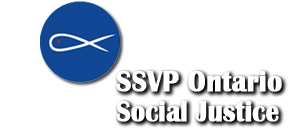





THE ADVOCACY VOICEThe Advocacy Voice represents our renewed emphasis on the importance of the Society of Saint Vincent de Paul having an active and informative voice which advocates for the systemic changes to current structures that tend to keep our neighbours in need living in poverty.Systemic change is simply the action and overarching theme of our advocacy efforts. While this systemic change is certainly needed externally, we must also be open to the understanding that it also requires internal change which starts with every Vincentian accepting the fact that Justice and Charity are the Two Feet of Love of our Society. This understanding requires a personal change in the way we look at both Justice and Charity. Our goal will be to research and prepare information and guidance for every council and conference which will enable their active participation in our advocacy efforts. You may find valuable information, on this page as well as in the resources section. There is a need to also give a voice to our neighbours in need. As one way to accomplish this you may find the NIN Interview program useful. Please find it on this page. Please consider supporting our advocacy and social justice efforts by including it as an agenda item for all meetings and sharing material we provide with your membership. Jim Paddon, Chair Public Policy Dialogue & Development Committee. |







